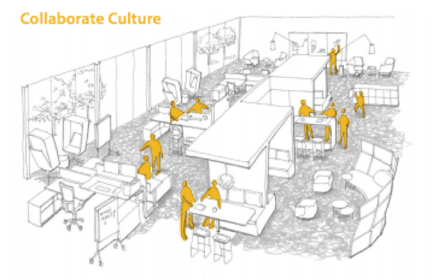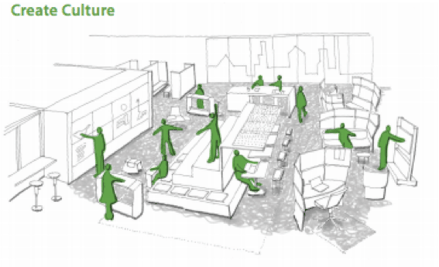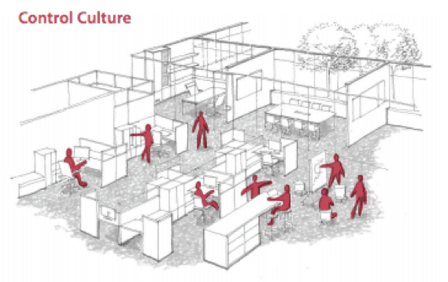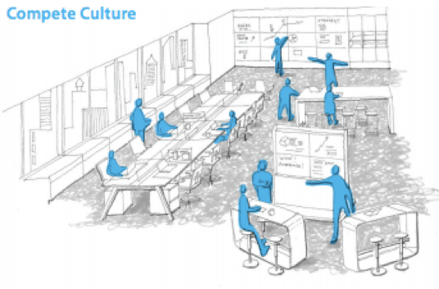.png)
You are in the process of finding success for your company, the desire is high, the workers are the right ones, but do you really know what kind of organizational culture exists in the environment of your company? Today we will explain more about why the organizational culture in a company plays a vital role to reach the top.
When the topic of organizational culture is brought to the table, it is time to pay attention, take out pencil and paper and consider implementing each of the elements that are presented below.
What is organizational culture?
Organizational culture is the grouping of norms, rules, procedures, principles and values that the members of a work team share and with which the operation of the company is established daily.
This culture is manifested in the way in which employees develop at the time of performing their tasks, interact with each other and find solutions when a crisis is presented, this includes 3 basic components for its operation:
- Values: The mission and vision of the company, as it represents itself.
- Assumptions: Attitudes that employees develop and that help the company to understand what they think of their processes and actions.
- Artifacts: What the company represents in the form of products, technologies, publications and processes.
The usefulness of an organizational culture in a company is legitimate, with it you can get to detect problems that are affecting the functionality and direction of the organization and propose a specific solution. It is also useful to train and segment groups with similar work characteristics in order to achieve a broader performance.
Culture creates an environment of order and commitment that influences all aspects of the organization. Its impact has a significant scope in the management, the process, the products, the attraction and the retention of employees.
Diagnosis as the beginning of organizational change
Many companies have no knowledge about the type of organizational culture they have and this represents a negative point in their search for success.
Making a diagnosis to determine what kind of culture the company belongs to is not only aimed at new companies. Even if it is known what type of culture the organization possesses, the diagnosis will serve to detect and make some changes in the structure, even if this is already successful.
The development of a change in organizational culture
According to Haworth, a prestigious American furniture manufacturing and distribution company, the organizational culture change occurs in 3 ways:
- Evolutionary, the change must take place slowly and with clear and established objectives.
- Focused, implication of certain measures imposed only on certain groups of the company.
- Revolutionary, the whole company must be part of the change. Although this can be turbulent and involve expenses.
There are 4 types of organizational culture, according to Haworth:
Collaborative Culture
This culture focuses on internal development in the long term, faithfully relies on work teams, participation and consensus to carry out work, supports a flexible work environment. It is concerned about people and their relationship with space. The work areas should include informal spaces, flexible meeting points and an organic design.
 Image: Haworth
Image: Haworth
Create culture
This type of culture focuses on doing things first, differentiating itself from other types by having a high degree of experimentation and individuality. The preferred spaces are areas where there’s freedom to develop creative ideas, an organic design with a highly flexible environment.
People like to take risks based on their creativity, ideas and the agility of their actions. They look for spaces that adapt to technological tools such as computers, tablets, interactive whiteboards and pen tablets.
 Image: Haworth
Image: Haworth
Control culture
The focus of this culture is to carry out the procedures to the letter, following steps fully established by the top management of the organization. People who identify with this culture, prefer to have an individual space and more formal rooms. A structured and symmetrical area.
However, sometimes the work teams look for alternative spaces where the social connections are a lot of help to devise or execute a plan.

Compete culture
The results are the priority for them, they concentrate on doing everything very fast with the goal of winning. They look for ways to have semi-formal spaces and with slightly more collaborative areas.
The spaces for this type of culture must be adapted for the development of individual and collective tasks. Areas where the presentation of ideas and solutions are informal but without falling into imprudence.

With all these elements, it is time to make a diagnosis and establish what kind of organizational culture your company has to enhance the talent of employees and that the results and objectives are achieved with greater satisfaction and success.
Organizational culture is the grouping of norms, rules, procedures, principles and values that the members of a work team share and with which the operation of the company is established daily.
.png)


